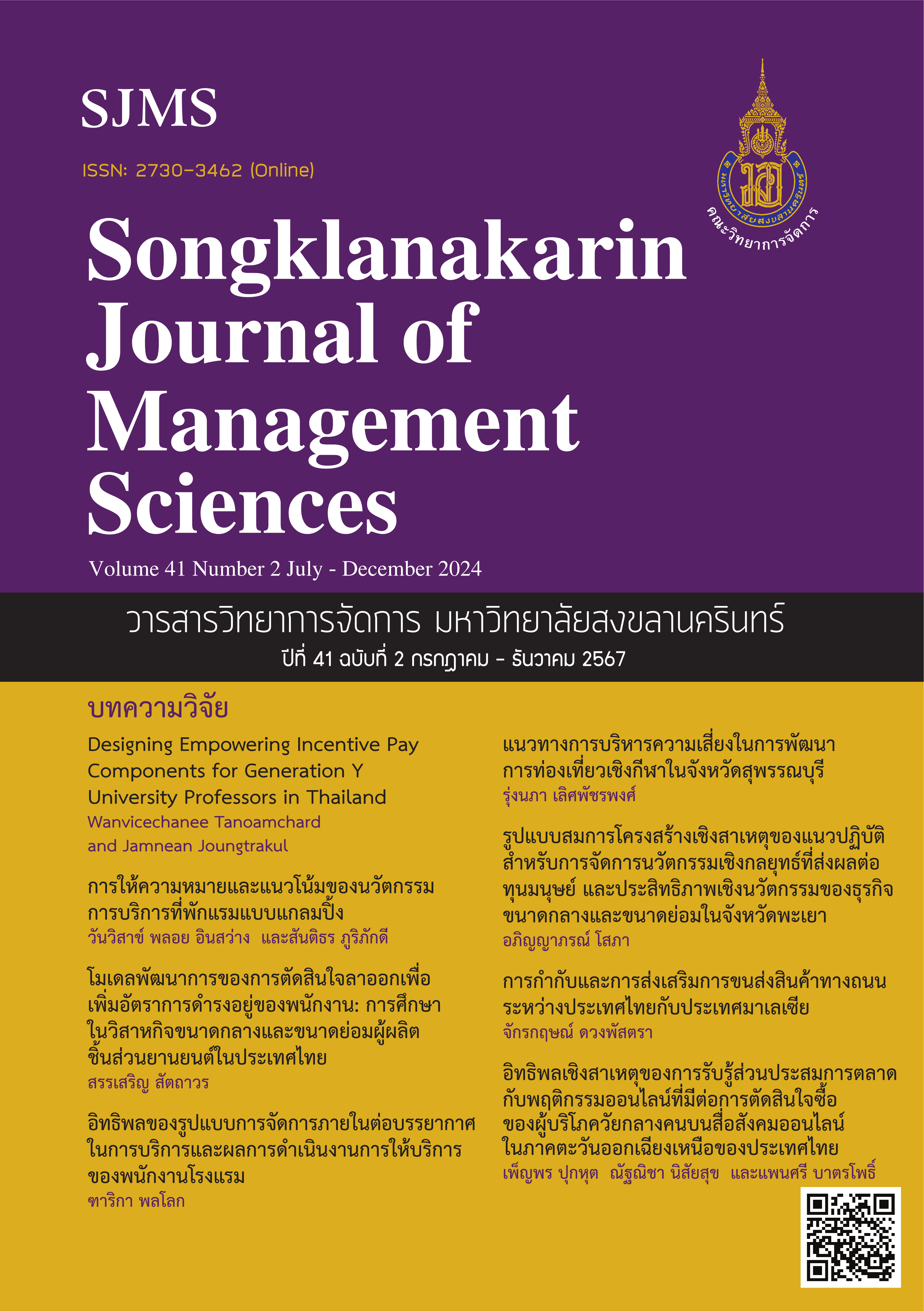The Guideline for Risk Management for Sport Tourism Development in Suphan Buri Province
Main Article Content
Abstract
This research aims to study risk management as guidelines for sports tourism development in Suphanburi Province, based on COSO's risk management principles, (COSO, 2020). The study was conducted by using qualitative research methods and using research tools by in-depth interviews of small discussion group with thirty key informants consisting of government representatives, private sectors representatives, and tourism experts.
The research study results found that there were important points of risk factors that affect goal achievement which need to improve as follows: (1) Lack of active support for sports and tourism from influential leaders in the province, (2) Lack of integrated cooperation among partner agencies network, (3) Lack of efficiency in marketing and public relations, (4) Regarding the situation of COVID-19 virus pandemic, thus, risk management guidelines for sports and tourism development in Suphanburi Province designed to choose the operation with two main strategies, which support the Risk Control Strategy and Diversification Strategy. Issue (1): Strategic planning and define roles for promoting sports tourism in the long run. Issue (2): Set up a cooperation network responsible for organizing sporting activities that promote tourism and links it to corporation in tourism development at state level. Issue (3): Use technology as main tool in developing integrated marketing communications. Issue (4): Create diversity in sporting activities at the community, corporate, and state level continuously and Issue (5): Developing a cooperative monitoring system for preventing, and controlling the spread of epidemics and natural disasters.
This study brings benefits to state agencies in the province in terms of setting up sports and tourism policies that are consistent with the local area. Network partners can apply the research findings to create activities and design guidelines for managing tourism and sports related activities that are consistent with the needs of the participants, public viewers and tourist which are consistent with the province’s outstanding features.
Article Details

This work is licensed under a Creative Commons Attribution-NonCommercial-NoDerivatives 4.0 International License.
All published articles are SJMS’s copyright. The editorial board allows all published articles to be copied, excerpted, or disseminated with academic citation.
References
Baratsas, V., & Tzavaras, P. (2023). Risk management practice in the tourism and hospitality industry. Proceedings of The 6th International Conference on Management, Economics and Finance. Prague: Czech Republic.
Chaisaengpratheep, N., & Phakpraphai, C. (2021). Guideline of Community Participation for Religious Tourism Development at Wat Phra That Phanom, Nakornphranom Province. Parichart Journal, 35(3), 71-90.
Coso. (2020). Compliance Risk Management: Applying the COSO ERM Framework. Retrieved January 6, 2023, from https://www.coso.org/Shared%20Documents/Compliance-Risk-Management-Applying-the-COSO-ERM-Framework.pdf
Daniels, T., & Tichaawa, T. M. (2021). Rethinking Sport Tourism Events in a Post-Covid-19 South Africa. African Journal of Hospitality, Tourism and Leisure, 10(4), 1241-1256.
Economics Tourism and Sports Division. (2017). Final report Sports Tourism (2017). Bangkok: Ministry of Tourism and Sports.
Graci, S. (2016). Collaboration and partnership development for sustainable tourism. Tourism Geographies, 15(1), 25-42.
Hodeck, A., & Hovemann, G. (2016). Motivation of active sport tourists in a German highland destination – a cross-seasonal comparison. Journal of Sport and Tourism, 20(3–4): 335–348.
Hopkin, P. (2012). Fundamentals of Risk Management: Understanding, Evaluating and Implementing Effective Risk Management. Kogan Page Publishers, London.
Klaydesh, P. (2021). A Study of Networking Development of Sangha Education Management for Reserving of Thai Social Development in 21st Century. Phimoldhamma Research Institute Journal, 8(2), 141-153.
Knott, B., Fyall, A., & Jones, I. (2015). The nation branding opportunities provided by a sport mega-event: South Africa and the 2010 FIFA World Cup. Journal of Destination Marketing & Management, 4(1), 46-56.
Meenoi, P., & Sungrugsa, N. (2022). Model and Strategies for Sports Tourism Management of The Western Region in The Context of Thailand 4.0. Dusit Thani College Journal, 13(2), 51-66.
National News Bureau of Thailand. (2018). Suphanburi Province received the “sports city” award. Retrieved May 2, 2023, from https://thainews.prd.go.th/th/news/detail/TNSPT001
Npprarat, K. (2020). Political Economy of Thai National Football. (Unpublished doctoral dissertation). Chonburi: Burapha University.
Pan, H. (2019). The Role of Sport in City Branding: A Case Study of Ottawa. (Master’s thesis, University of Ottawa). Canada.
Phonwichai, T., & Phothong, P. (2018). An Analysis of Economic and Social Value for Sport Tourism Events. UTCC Academic day (2nd). June 8, 2018, Bangkok: University of the Thai Chamber of Commerce.
Rehman. S., Gulzar, R., & Aslam, W. (2022). Developing the Integrated Marketing Communication (IMC) through Social Media (SM): The Modern Marketing Communication Approach. SAGE Open, 12(2), 1–23.
Suphanburi Provincial Govennor's Office. (2022). Suphanburi Provincial Development Plan 2023-2027. Suphanburi: Suphanburi Provincial Govennor's Office.
Toader, I. A., & Mocuta, D. N. (2020). The Risk Management in the Tourism Rural Tourism and Agrtiorism. Scientific Papers Series Management, Economic Engineering in Agriculture and Rural Development, 20(2), 477-482.
Tourism Authority of Thailand. (2017). 9 new trends in the future of tourism. Bangkok: Tourism Authority of Thailand.
Ural, M. (2016). Risk management for sustainable tourism. European Journal of Tourism, Hospitality and Recreation, 7(1), 63-71.
Worapinit, P., & Jantarakolica, K. (2020). The Guideline of Sports Tourism Model in Thailand. Southeast Bangkok Journal, 6(2), 32-44.
Zakaria, J., Harun, M., Salamuddin, N., & Taff, M. (2016). Risk Management Practices towards Developments of Sport and Recreational Activities in Malaysia. Open Access Library Journal, 3(7), 1-11.

